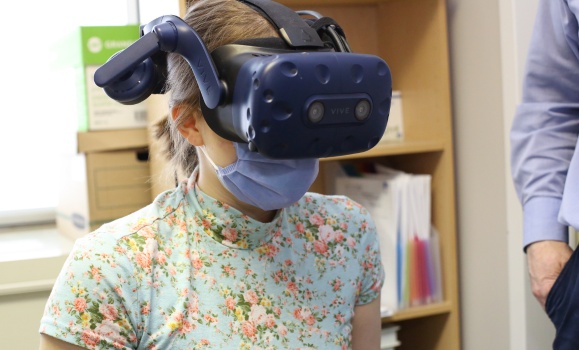News
» Go to news mainClinical Vision Science looks to Virtual Reality technology to improve care

Members of the Dal Faculty of Health Clinical Vision Science program are investigating the use of Virtual Reality in the assessment of binocular vision disorders. Dr. Darren Oystreck (orthoptist) and Emma Smeltzer (MSc Clinical Vision Science student) are currently testing a VR platform created by industry partner Electric Puppets – a local software company. “We are just scratching the surface of what this might allow us to do” says Dr. Oystreck.
At present the gold standard for assessing binocularity problems worldwide requires the use of special filters before each eye with a limited ability to control the visual environment. This approach has remained essentially unchanged over the past 50 years. Utilization of VR allows manipulation of the visual environment in ways not previously possible, allowing the clinician to have full control what a patient sees.
“With this technology we wondered if we could conduct our vision tests better? Faster? And even remotely?” Smeltzer says.
While clinical tests remain time-intensive, work is under way looking at how VR replicated versions can improve efficiency and accuracy.
Smeltzer and Dr. Oystreck sought a more precise and friendly alternative to current vision function testing— this is where VR came in. At Dal Innovates 2018, Dr. Oystreck met Ryan Cameron, founder and president of Electric Puppets.. After a tour of the clinic Cameron and Dr. Oystreck decided to collaborate and created the clinic’s VR binocular vision function lab.
“By identifying research needs and requirements with the IWK eye clinic and Dalhousie, we've created a patent pending platform that facilitates research and clinical assessment using VR. This platform is the first of its kind to establish standards of technology and practice in this emerging field of innovation,” explained Cameron.
“Results thus far are promising” says Smeltzer.
Results of this pilot study will be presented this June at a national ophthalmology conference. Next phases of research will focus on further refinement of visual stimuli and its use in as a remote testing platform.
The clinic
The Clinical Vision Science program resides within the IWK Pediatric Ophthalmology clinic and sees patients from all Atlantic provinces.
The Pediatric Ophthalmology & Strabismus division (the ‘Eye Clinic’) is located on the 6th floor of the IWK Health Children’s building. The department has state of the art equipment for the investigation and management of all pediatric eye problems and adults with disorders of binocular vision or eye misalignment (strabismus). It also houses the only visual electrophysiology lab east of Montreal.
In addition to a full complement of testing lanes, the department contains a classroom and graduate student meeting space allowing students to have hands on clinical experiences and after hour practice labs.
Both Dr. Oystreck and Smeltzer maintain that this environment allows excellent student learning experiences.
As of July 1, Dal’s Clinical Vision Science Program will be the only one of its kind in Canada.
Recent News
- Bridging continents: Dal students to learn, share and connect in West Africa
- Partnership between UpLift and Public Health sees continued funding allocated for Youth Engagement Coordinators
- Dal Health grad students use podcasting to discover the people behind the science
- Nursing student closer to living out her dream of helping people thanks to support of new award
- Master of Nursing grad passionate about working in mental health and addictions
- MSc Audiology grad shifts career from entomologist to audiologist
- Occupational Science grad exploring concept of care farming
- Dal Crossroads continues 20 year legacy of student ‑led learning
